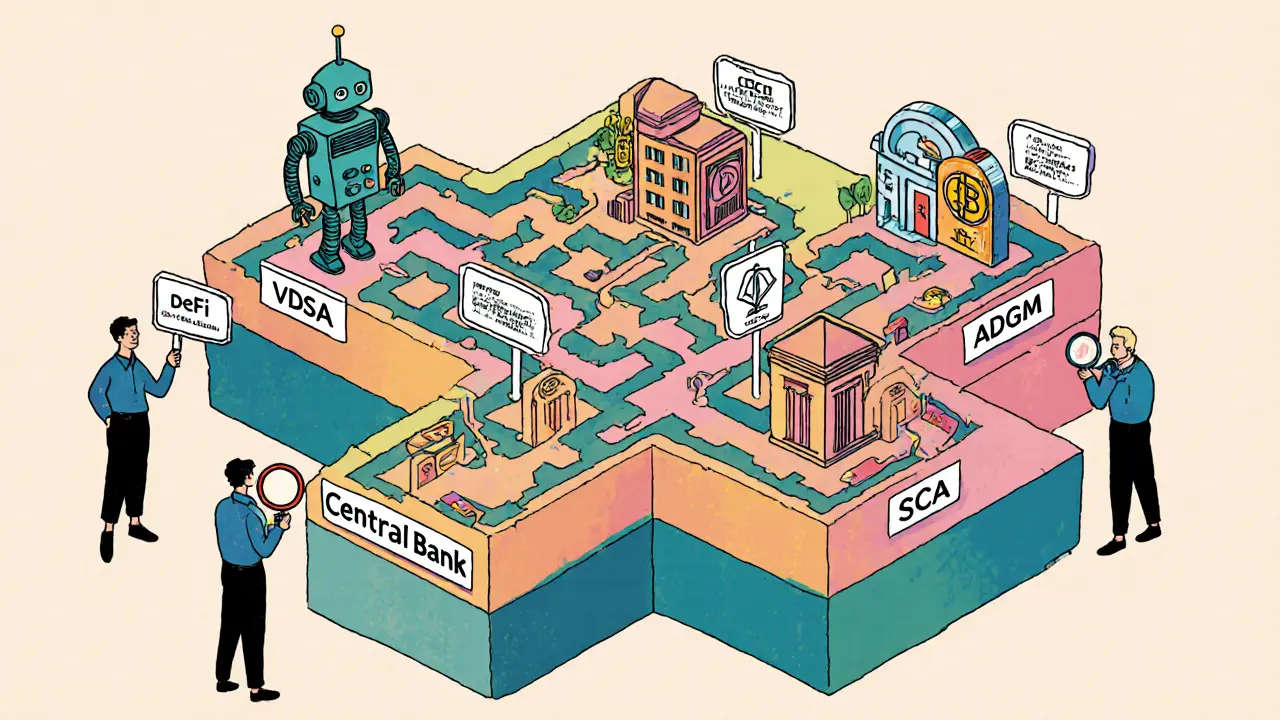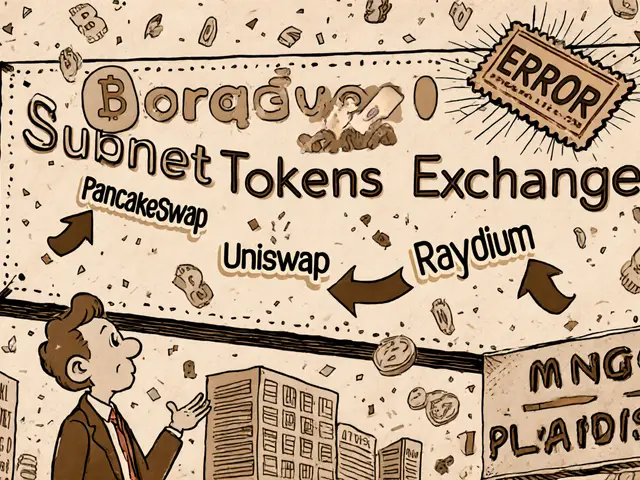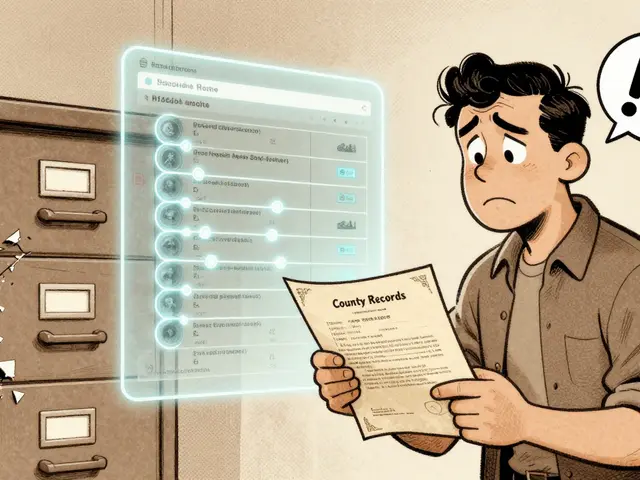
UAE Crypto License Cost Calculator
Calculate Your UAE Crypto License Costs
The United Arab Emirates isn’t just welcoming cryptocurrency companies-it’s actively building the world’s most structured, government-backed crypto ecosystem. While countries like the U.S. and Europe wrestle with patchy rules and enforcement delays, the UAE has already created a clear, multi-layered system that lets businesses operate legally, securely, and at scale. This isn’t speculation. It’s happening right now, with Binance, Crypto.com, and Bybit setting up regional HQs in Dubai and Abu Dhabi. If you’re looking to launch a crypto exchange, custody service, or token project, the UAE isn’t just an option-it’s the most viable path forward in 2025.
How the UAE’s Crypto Rules Actually Work
The UAE doesn’t have one crypto regulator. It has five. That’s not a flaw-it’s a feature. Each jurisdiction serves a different kind of business, and knowing which one fits your model makes all the difference. At the federal level, the Securities and Commodities Authority (SCA) oversees investment-linked tokens, while the Central Bank of the UAE handles payment tokens. But the real action happens in the free zones.Dubai’s Virtual Assets Regulatory Authority (VARA) is the most comprehensive. If you’re running an exchange, custody service, or issuing tokens, VARA is where you go. Their license covers six core activities: trading platforms, fiat-to-crypto brokers, crypto-to-crypto brokers, money transfer services, wallet providers, and token issuance. Token issuance itself has two tiers: Category 1 requires direct approval from VARA (think security tokens or asset-backed coins), while Category 2 lets you distribute tokens through a licensed entity-perfect for utility tokens or closed-loop systems.
Meanwhile, the Dubai International Financial Centre (DFSA) and Abu Dhabi Global Market (ADGM) offer their own licenses, often preferred by institutional investors or firms already operating in traditional finance. These regulators follow international standards like FATF and IOSCO, giving them credibility with banks and global partners.
The key takeaway? You don’t need to pick one regulator and hope it fits. You pick the one that matches your business type, customer base, and long-term goals. A DeFi startup might thrive under VARA. A hedge fund launching tokenized real estate might go with DFSA. The UAE gives you options-and that’s rare.
What It Costs to Get Licensed
Let’s talk numbers. Getting a crypto license in the UAE isn’t cheap, but it’s transparent. There are no hidden fees or surprise audits. Here’s what you’re looking at:- Application fee: AED 40,000-100,000 ($11,000-$27,000)
- Annual supervision fee: AED 80,000-200,000 ($22,000-$54,000)
- Minimum paid-up capital: AED 100,000 to over AED 1.5 million ($27,000-$408,000), depending on activity
- Insurance: Mandatory for custody and exchange services
These aren’t startup fees. These are institutional-grade costs. That’s why the UAE attracts serious players-not fly-by-night operators. VARA requires a full business plan, fit-and-proper checks on founders, cybersecurity audits, and detailed AML/CFT procedures. You can’t just register a company and start trading. You need infrastructure, compliance officers, and real operational depth.
But here’s the flip side: once you’re licensed, you’re not just legal-you’re trusted. Banks in the UAE, Europe, and Asia are more willing to work with VARA-licensed firms than with entities from jurisdictions with vague or unenforced rules. That access to banking is worth far more than the upfront cost.
The Tax Advantage You Can’t Ignore
In 2024, the UAE made a bold move: it exempted most crypto transactions from the 5% VAT. That means buying Bitcoin, swapping Ethereum for Solana, or cashing out to AED? No tax. No reporting. No hassle. This isn’t temporary-it’s permanent policy.And while global tax authorities are pushing for crypto reporting, the UAE is staying ahead. Starting in 2027, the Crypto-Asset Reporting Framework (CARF) kicks in. But here’s the catch: it’s not a tax. It’s transparency. Exchanges and custodians will report transaction data to the Ministry of Finance, which will then automatically share it with other countries under international agreements. Think of it like the Common Reporting Standard (CRS) for bank accounts-but for crypto.
That means if you’re a resident of Germany or Canada and you trade on a UAE exchange, your home country will get your transaction history. But if you’re just a user in the UAE? You pay zero tax on crypto gains. No capital gains tax. No income tax on trading. No VAT. That’s the most favorable tax regime in the world for crypto users right now.

Why the UAE Beats Other Crypto Hubs
Compare this to other jurisdictions. In the U.S., you face state-by-state licensing, SEC lawsuits, and unclear guidance on whether your token is a security. In the EU, MiCA is complex, slow to implement, and still lacks clarity on DeFi and NFTs. Singapore is friendly but tightening rules on retail access. The UAE doesn’t just have rules-it has a strategy.The UAE is targeting three things: institutional adoption, real-world asset tokenization, and global connectivity. That’s why you see major players like BitGo and Laser Digital setting up custody operations here. That’s why tokenized bonds, real estate, and commodities are being launched on UAE-regulated platforms. And that’s why the country is building data centers, blockchain infrastructure, and legal sandboxes to support next-gen applications.
Geographically, the UAE sits between Europe, Africa, and Asia. It’s a 4-hour flight to London, a 3-hour flight to Mumbai, and a 6-hour flight to Johannesburg. That makes it the natural hub for cross-border crypto flows. No other country offers that combination of regulatory clarity, tax benefits, and location.
What’s Coming Next
The UAE isn’t resting. In 2025, VARA is finalizing rules for decentralized autonomous organizations (DAOs), making it possible to legally register and operate DAOs under its umbrella. The Central Bank is testing a digital dirham for institutional use. And the Ministry of Finance is working with the IMF and World Bank to set global standards for crypto tax reporting.One of the biggest shifts is in real-world asset (RWA) tokenization. Banks, asset managers, and even government entities are now exploring how to tokenize gold, real estate, and infrastructure projects on blockchain. The UAE’s regulatory framework is the only one in the world that already allows this at scale. In 2024, a Dubai-based firm tokenized $500 million in commercial real estate and sold it to institutional investors across 12 countries-all under VARA supervision.
That’s not futuristic. That’s today.

Who Should Consider the UAE
If you’re a crypto startup looking to scale, the UAE is the place to be. It’s not for hobbyists. It’s not for people who want to avoid compliance. It’s for founders who want to build a real, long-term business with global reach.Here’s who thrives:
- Exchanges serving Middle Eastern, African, or Asian users
- Custody providers needing bank relationships in the region
- Token issuers launching asset-backed or utility tokens
- Blockchain firms building DeFi protocols or RWA platforms
- Web3 companies needing a legal base with global credibility
If you’re just testing the waters with a small peer-to-peer service? Start elsewhere. The UAE demands professionalism. But if you’re ready to operate at scale, with real compliance and real infrastructure, no other country gives you this much clarity, support, and opportunity.
Final Thought: It’s Not About Avoiding Rules-It’s About Mastering Them
The UAE doesn’t let you escape regulation. It gives you a map to navigate it. Other countries say, “We don’t know how to regulate crypto.” The UAE says, “Here’s exactly how we do it-and here’s how you join.” That’s why it’s becoming the global hub. Not because it’s easy. But because it’s the most reliable.Is crypto legal in the UAE?
Yes, crypto is fully legal in the UAE, but only if operated under a licensed regulatory framework. Unlicensed trading, mining, or offering services to the public is prohibited. All exchanges, custodians, and token issuers must obtain a license from VARA, DFSA, FSRA, SCA, or the Central Bank of the UAE, depending on their activity.
Do I pay tax on crypto in the UAE?
No, individuals in the UAE do not pay capital gains tax, income tax, or VAT on crypto transactions. The 5% VAT exemption for virtual assets took effect in November 2024 and remains in place. However, licensed entities must comply with the upcoming CARF reporting rules, which require them to share transaction data with tax authorities in other countries.
Can I get a crypto license in Dubai without a local partner?
Yes. VARA allows 100% foreign ownership for crypto businesses. You don’t need a local sponsor or partner to apply for a license. However, you must incorporate your company in Dubai (or another licensed free zone) and meet all capital, compliance, and operational requirements set by the regulator.
How long does it take to get a crypto license in the UAE?
The process typically takes 4-8 months, depending on the complexity of your business model and how complete your application is. VARA requires detailed documentation on technology, compliance, risk management, and financial projections. Companies that prepare thoroughly and hire experienced legal advisors often get approved faster.
Is the UAE safe for crypto investors?
Yes, the UAE is one of the safest jurisdictions for crypto investors globally. Licensed platforms must follow strict AML/CFT rules, undergo regular audits, maintain insurance, and separate client funds from company assets. The regulatory authorities actively shut down unlicensed operators and have recovered millions in fraudulent crypto schemes since 2022.





Comments (23)
Pranjali Dattatraya Upadhye
Okay, but let’s be real-the UAE didn’t just wake up one day and say, "Let’s be the crypto Disneyland!" They saw how messy everything else was and said, "We’ll do it right, with glitter and gold-plated compliance." 🌟 I mean, who else offers zero capital gains tax AND a regulator that actually answers emails? I’m from India, and even our "friendly" crypto stance feels like walking through a minefield in flip-flops. Here? It’s like a five-star resort with a legal team on speed dial.
Kyung-Ran Koh
This is exactly why I relocated my firm to Dubai last year-VARA’s clarity is a godsend. I’ve dealt with SEC grey zones, MiCA’s 800-page legalese, and Singapore’s sudden U-turns. Here, you know exactly what’s expected: documentation, audits, capital reserves. No guesswork. And yes, the fees are steep-but you’re paying for certainty, not luck. 💼✨
Missy Simpson
I’m so excited!!! This is the future!!! 🥳 I’ve been waiting for someone to actually make crypto legal and safe and not just say "we’re working on it" for 5 years!! The UAE is literally doing the thing!!! I’m crying happy tears!!!
Tara R
The UAE is not a hub it is a tax haven with a PR team and a penchant for branding. The so called regulation is merely window dressing for capital flight. Real institutions do not need this. They operate in jurisdictions with rule of law not rule of permits
Matthew Gonzalez
It’s funny how we treat regulation like a cage when it’s really the scaffolding. The U.S. is scared of building anything because it might limit innovation. The UAE? They built the whole damn building first-then handed out keys. That’s not luck. That’s philosophy. Crypto isn’t about chaos. It’s about trust. And trust needs architecture.
Michelle Stockman
Oh wow, another article about how the UAE is the "only real option" because they have a license fee higher than my rent. Congrats. You turned Web3 into a gated country club where only billionaires get to play. Meanwhile, the rest of us are still trying to figure out if we can buy Dogecoin without getting audited by the IRS. 🤡
Alexis Rivera
The UAE’s model isn’t about being the easiest-it’s about being the most intentional. They didn’t chase hype. They studied failure. They saw how the U.S. fragmented regulation, how Europe overcomplicated MiCA, how Singapore caved to retail pressure. So they built a system where institutions can breathe. That’s leadership. Not because it’s flashy-but because it’s durable.
Eric von Stackelberg
Let me ask you something: Who controls the data flow under CARF? Who owns the digital dirham’s backend? And what happens when the UAE decides to freeze accounts under "national security"? This isn’t freedom-it’s surveillance with a smile. They’re not building a crypto hub. They’re building a financial panopticon. And you’re applauding it.
Emily Unter King
The RWA tokenization play here is game-changing. We’re talking about institutional-grade liquidity bridges between traditional finance and on-chain assets-structured under VARA’s custody rules, audited by PwC, with real legal recourse. This isn’t DeFi 2.0. It’s DeFi 5.0. And the infrastructure stack? Built for institutional settlement layers, not memecoins.
Michelle Sedita
I used to think crypto was about decentralization… until I realized the UAE is the most centralized version of it that actually works. And honestly? I’m okay with that. If you want to build something that lasts, you need anchors. Not just code. Not just ideology. Real institutions. Real lawyers. Real audits. The UAE gives you that. And that’s beautiful.
Cierra Ivery
Wait-you’re telling me I can’t just create a token and sell it to my Discord group and call it a day? What about freedom? What about the spirit of crypto? This isn’t innovation-it’s corporate compliance with a desert view. And don’t even get me started on the VAT exemption… it’s just a trap to lure in the gullible. I’ve seen this movie before. It ends with a regulator shutting everything down.
Nitesh Bandgar
THE UAE ISN’T A HUB-IT’S A MIRAGE!!! 🌪️ I’ve been there. I’ve seen the shiny towers. But behind the glass? Empty offices. Fake licenses. Shell companies. The regulators are in cahoots with the big exchanges. They don’t care about you. They care about the AED inflow. And when the money dries up? Poof. Gone. Just like the Dubai property bubble. History repeats. You think you’re safe? You’re just the last one holding the bag.
Jessica Arnold
What’s fascinating is how the UAE’s model mirrors ancient trade routes. They’re not inventing crypto-they’re re-architecting commerce. Just like the Silk Road needed caravanserais, safe passage, and standardized weights, the UAE is building the digital equivalents: licensed custody, CARF reporting, legal personhood for DAOs. This isn’t tech-it’s civilization-level infrastructure.
Chloe Walsh
UAE is the new Switzerland… except Switzerland didn’t need to spend $2 billion on a PR campaign to convince people they’re not a tax haven. And also, Switzerland doesn’t have a king who tweets about Bitcoin. 🤡
Stephanie Tolson
To everyone panicking about regulation: this isn’t the end of crypto freedom. It’s the beginning of crypto maturity. We’ve spent a decade in the Wild West. Now we’re building schools, hospitals, and roads. The UAE isn’t killing innovation-they’re giving it a foundation. And if you think that’s boring? You’re not ready for the next phase.
Anthony Allen
I’ve lived in Dubai for 5 years. The crypto scene here isn’t hype-it’s hustle. You walk into a coffee shop and someone’s pitching tokenized real estate. You go to a co-working space and there’s a VARA compliance officer sipping a latte. It’s weird. It’s real. And honestly? It works. You don’t need to love it-you just need to understand it’s not a gimmick.
Megan Peeples
Oh wow, so now we’re supposed to be impressed because a monarchy has a license fee? How progressive. I’m sure the average Emirati citizen is just thrilled to be part of this glittering crypto utopia. Meanwhile, their own kids are stuck with 10-year visas and no citizenship. But hey-your tokenized bond portfolio is safe. 🤷♀️
Sarah Scheerlinck
I appreciate how thoughtful this breakdown is. It’s easy to get swept up in the hype, but this lays out the real trade-offs: cost, clarity, and credibility. I’ve talked to founders who fled the U.S. because they couldn’t get a bank account. Here? They can. That’s not magic. That’s policy. And it matters more than any whitepaper.
karan thakur
Do not trust the UAE. This is a Western propaganda campaign disguised as policy. The Central Bank is a puppet of the IMF. The VARA license is a trap to extract your IP and sell it to Chinese state-backed entities. Crypto is a tool of financial colonization. And you are the colonized.
Evan Koehne
So the UAE is the "most viable path"? Cool. That’s like saying the Titanic was the most viable path to New York… if you ignore the iceberg. You’re not seeing the collapse. You’re just admiring the deck chairs.
Vipul dhingra
Why do you think the UAE has so many regulators? Because they are trying to cover up the fact that they have no idea what they are doing. You think VARA is professional? Last year they shut down 300 companies overnight because someone forgot to submit a form in Arabic. This is chaos with a suit
Jacque Hustead
I used to think crypto was about freedom. Now I think it’s about finding the right home. The UAE isn’t perfect-but it’s the first place I’ve seen that actually treats crypto like a serious industry, not a casino. I don’t need to be a rebel to build something real. Sometimes, you just need a map. And this one works.
Matthew Gonzalez
What’s interesting is how this mirrors the rise of Singapore in the 90s. Everyone laughed. Then everyone moved there. The UAE isn’t trying to be the most libertarian place-it’s trying to be the most functional. And in crypto, function beats ideology every time.